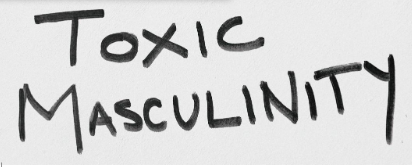Understanding and Addressing Toxic Masculinty

October 15, 2020
Imagine stepping foot on campus and feeling immediate anxiety about walking to class because you feel like people are looking at youㄧjudging you. You feel overwhelmed. Because of this, you begin to feel weak. And, the next thing you know, you begin to feel inadequate because you feel that you are shying away from the challenge of facing all of the people’s looks and are waiving in your performance of masculine ways.
This is how Jared Yates Sexton, author of “The Man They Wanted Me To Be” and associate professor of writing at Georgia Southern, explained the beginning of his experience with toxic masculinity while in college.
Sexton said that as a result of feeling that way, he consciously made the decision to overcompensate. He said he started dressing more like the men who raised him: in flannels, jeans and boots. The same men who abused himㄧbecause a lot of these ideas are learned through abuse, socialization and mistreatment.
Many people shy away from the topic of toxic masculinity due to the implications the phrase carries with it.
Some common beliefs are that toxic masculinity does not exist or that the phrase is meant as an insult, but when discussed and explained properly, people will come to realize that the topic, though it may be hard, is important to explore and understand.
Toxic masculinity is not a term calling men evil or bad, and it is not an implication that men are naturally violent and angry.
Instead, toxic masculinity is what happens when men feel inadequate in their masculinity, which leads to overcompensation. This overcompensation is what is considered “toxic masculinity” or at least what leads to toxic masculinity.
What is Toxic Masculinity?
Before addressing toxic masculinity, “masculinity” and “femininity” both need to be talked about.
”Toxic masculinity actually was inspired by a feminist movement called toxic femininity, according to “What We Mean When We Say, ‘Toxic Masculinity’”.
“I do not think that there is a fix until we deal with the issue of gender inequality in general–when we stop defining masculinity as the opposite of femininity,” Baker Rogers, assistant professor of sociology at Georgia Southern, said.
Toxic masculinity is what occurs when men overcompensate because they can not reach the unattainable construct of masculinity.
“Masculinity is a gender, which is a construct, right? This is a societal idea of what supposedly men and women and people are supposed to be and how they are supposed to behave based on pressures and traditions,” said Sexton.
Sexton explained that masculinity is not necessarily male because there is a difference between sex and gender. Therefore, the ideas about traditional masculinity that a lot of men have grown up in is a really rigid construct. You have all of these expectations, the idea that you are supposed to be stoic and you are not supposed to feel. The thing about this is these ideas are unachievable because men feel just as much as women.

“When men come short of these expectations, they suffer fragile insecurity, and men who feel insecure in their masculinity overcompensate by over-performing ideas of masculinity,” Sexton explained.
This can often leads to violence and abuse and it will cause men to torture themselves inward and outward.
Adrianna Horowitz reported for Pew Research Center that 6 in 10 men feel pressure to throw a punch if provoked.
“So, it is just a big, large thing because men are a lot of times unable to get outside of the gender construct and their frustration and insecurity leads to overcompensation, which leads to different forms of violence” said Sexton.
“I think the way we define masculinity in general is toxic because we define it in opposition as higher than, better than femininity,” Rogers said.
Rogers also said that when people normally use that term, they are referring to the more extreme aggression that we see in the media.
Lauren Patterson, licensed psychologist who works at the Georgia Southern Counseling Center and chair of the Sexual Assault Response Team (SART), explained her experience with toxic masculinity on campus.
She said because of her position as the chair of the SART on campus, “a lot of conversation and talk about sexual violence is linked to toxic masculinity.”
College Student Experiences with Toxic Masculinity
Joseph Napollilo, sophomore writing & linguistics major and a member of the ROTC, said “I’ve seen guys who have been bullied into low self-esteem and then they overcompensate and try to be more alpha, and it can lead to conflict with other people.”
Kaitlyn Rediker, junior biochemistry major, said her experience with toxic masculinity has to do with being a biochem major.
“Women used to not be able to be doctors. It was frowned upon. We belonged at home being housewives and mothers, so if anyone ever puts you down in the path of becoming a doctor, it is going to be men telling you that you are not good enough.”
Joshua Collins, junior graphic design major, said that his experience with toxic masculinity was actually through his old neighbor. Collins explained that his neighbor was emotionally illiterate and that he shut off all emotion other than anger or irritation. He said that this was a result of his father abandoning his family.
“I think that toxic masculinity here in the south, especially on campus …is almost like a bubble here,” said Adriana Eskew, junior geology major .
Eskew also said that men normally do not acknowledge the fact that they are performing and they do not understand the long term implications of it.
Micheal Smith, junior writing and linguistics major, said that his experience with toxic masculinity has to do with men talking about women like they are lesser beings. The anecdote he used was when a girl leaves a room of guys, the guys are normally going to talk about her physical features in a degrading way.
Toxic Masculinity’s Affect on Fraternities
Patterson said, “Toxic masculinity seems to have a greater impact or show up more often when there’s also some level of what’s called groupthink involved,” said Patterson.
It is what leads men in these groups to substance abuse, sexual assault and hazing. Not all fraternities are like this, and there are many benefactors to joining a fraternity, but addressing toxic masculinity’s affect on them is a step in the right direction for all fraternities.
Milas Avery, senior president of Zeta Delta Delta, said “I believe that toxic masculinity is something that is a trend in the community. In my fraternity, we have different programs and health initiatives where we sit down and talk where we break down certain barriers and validate one another.”
An example of toxic masculinity that could pertain to fraternities as well is when men get together and they do not feel secure in their masculinity. This leads to them putting up a front and competing and overcompensating until they are not even themselves anymore, just the character that they are trying to portray.
When men join fraternities, they are a part of this exclusive group of men, where everyone is looking to “feel important or feel like they belong,” said Rogers.
Rogers also said that men join fraternities “to gain a sense of brotherhood; then they are made to compete. And this always harms a lot of men and harms women.”
This competition is what can lead to substance abuse, sexual assault and hazing, explained Rogers.
“Those who belong to a fraternity may exhibit hypermasculinity which includes incredible amounts of negative language around women and gay men to ensure that their masculinity is never questioned,” according to Alisha Ram in her study called “Masculinity in Fraternities.”
An article from College Student Affairs Leadership called “The Final Battle: Constructs of Hegemonic Masculinity and Hypermasculinity in Fraternity Membership” by Alex Zernechel and April Perry discusses the belief that when men join a fraternity “the individual could lose his “man-card” for actions or comments that were deemed feminine or not masculine.”
This is based on the belief that it is feminine to express emotion.
“There is an idea that men are not able to be around other men and show affection and show comradery without self destructive behavior,” said Sexton.
Sexton also points out that an example of this is when men go to hug one another, and they pat each other on the back.
“Yes, this is a show of emotion, but there was also some pain in it” said Sexton.
“There is this idea that if you are around another man and you’re not engaging in overtly hyper masculine behaviors then you yourself have failed, and you might, you know, suffer humiliation,” said Sexton.
“Unfortunately, the secrecy and loyalty paired with the strong identification with traditional masculine ideas create an environment where actions are not held accountable and aggressive/violent behavior may go ‘unnoticed,’” according to Ram.
The following are hazing reports for GS fraternities since 2018, according to a Freedom of Information Act filed to Georgia Southern’s record office:
In 2018, Kappa Alpha Psi was suspended and lost recognition on the Statesboro campus due to incidents involving hazing.
In 2018 and 2019, Delta Tau Delta was suspended from the Statesboro Campus. Both times were for accounts of hazing.
In 2019, Alpha Epsilon Pi was suspended from the Statesboro campus due to hazing as well.
Griffin Ziegler, who joined Delta Sigma Phi in 2016 and was president from November 2018 to October 2019, said that because of their system for recruiting being more varied “if there was any toxic masculinity affecting my fraternity, it was really low. I don’t really think there was.”
The George-Anne Reflector reached out to the Director of Fraternity and Sorority Life multiple times and received no direct response.
Rape Culture and Toxic Masculinity
“Rape culture and toxic masculinity go hand-in-hand,” said Patterson.
The National Intimate Partner and Sexual Violence Survey found that 1 in 5 women have experienced rape victimization in their lifetime, and 51% of female rape survivors reported victimization by a current or former intimate partner. Research also indicates that sexual aggression against women is primarily perpetrated by men.
“Much research has demonstrated that men who endorse and internalize several aspects of hegemonic masculinity are at greater risk for perpetrating sexual aggression toward women,” according to Psychology of Men and Masculinity.
Patterson also said “in the event of like a more extreme way, toxic masculinity really impacts rape culture and sexual violence and the perpetration of sexual violence.”
She gave an example of the movie “The 40-Year-Old Virgin” and how it had this whole scene where men are talking about getting women drunk in order to increase the chances of them having sex.
“By reinforcing ideas that men are taught to seek out sex, and it becomes kind of a game or mission because society tells men that it is a good thing to then seek out sex from women, and that kind of goes hand in hand with toxic masculinity,” said Patterson.
Messages such as these penetrate our society and our consciousness and normalizes it and makes it okay, said Patterson.
Patterson explained that, when something called groupthink is involved, men seem more accepting of things in the realm of toxic masculinity such as predatory sexual behavior and unaccepting of more “feminine” things such as expression of emotion.
Rogers said that one of the biggest ways toxic masculinity affects college students is the sexual assault culture.
“It revolves around athletic and fraternity culture which are very big into this toxic masculinity, where proving your manhood is important,” Rogers said.
Sexton explained that the way he sees toxic masculinity affecting college students, and the one most people are familiar with, is the idea of rape culture.
“Part of the masculine ideal is a hierarchy, which is basically that men are rational and strong, and, as a result, women are irrational and weak, and so they are treated as lesser beings,” said Sexton. “And so, they take advantage of women and hurt women.”
The idea of loneliness feeds into toxic masculinity as well.
Sexton explained that men have a difficult time going from the major idea of rape culture to the idea of loneliness because men are taught to not express themselves.
“This leads to them not having outlets for intimacy–they do not have good friendships, they do not have support which leads to their mental health suffering,” he said.
He explained that another factor is like the way he felt an insecurity in his masculinity, “because men know constantly that they are not living up to these expectations and they are not totally strong and stoic and invincible.”
“You see a lot of men who over perform these things,” said Sexton. ”They are binge drinking.They are using drugs.Their academic performance suffers. Their personal relationships suffer, and a lot of them are lonely.”
Sexton also said that, normally, because of mental health problems, men self-medicate through drinking and doing drugs. A lot of times, they get lost in these ways of coping–and these problems are not only affecting college students, but also men throughout society as a whole. He explained that men’s lives can fall apart due to this toxic masculinity.
Men and Mental Health
Men and mental health are two words that people normally would not put together–and if they are, they usually carry a stigma. Considering college can put a strain on mental health, it is important to address the stigma that men are inadequate if they suffer with their mental health.
“At any one time, it is believed that one in five women and one in eight men are diagnosed with a common mental illness, such as anxiety, depression, panic disorder or obsessive compulsive disorder” according to the Counseling Directory.
The Counseling Directory also reported that “talk therapy has been shown to help with many of the key mental health issues experienced by men, including stress, anxiety, addiction and depression.”
Men tend to suppress their feelings to the point where they are not even able to understand that their feelings are their feelings, said Sexton.
“Men sort of mask everything under the space of control,” said Sexton.
Sexton explained that when men, or anyone for that matter, bottle up their emotions, it is hard to understand what is going on inside of their heads.
“If you’re not going to complain, then there is no way to understand what is going on internally,” said Sexton.

In other words, talking out your feelings can help you understand exactly what you are feeling.
More than 8 in 10 men feel pressure to be emotionally strong, according to Horowitz.
Patterson explained that bottling up emotions is dangerous because when men cannot recognize distinct feelings, the only emotion that is prevalent is anger. This can lead to physical abuse, emotional abuse and even substance abuse.
“Physical injuries are akin to mental health injuries,” said Sexton.
Benjamin Drevlow, lecturer for writing and linguistics at Georgia Southern, said that you have to “remember that all men are going through this. It is a matter of being brave enough and man enough to admit it.”
Once men start communicating their feelings, regardless of their fear of being seen as inadequate or their fear of being judged, the stigma surrounding men struggling with mental health may begin to disappear.
Drevlow said that we are a couple of generations away from this, however, because the people who socialize the men of current generations tend to enforce the idea of masculinity, which leads to toxic masculinity overall.
Toxic masculinity is what happens when men try to reach this unattainable construct called masculinity, and when they cannot, they try to overcompensate until their masculinity becomes toxic.
In his book, “The Man They Wanted Me to Be,” Sexton explains what toxic masculinity is:
This, I’ve come to learn, is how toxic masculinity works. Most every man suffers for his inability to live up to the rigors of masculinity as a child, and most every man feels like an outsider…The performance continues until there’s no performance anymore. There’s just a man who knows no other way.
Jared Yates Sexton, “The Man They Wanted Me to Be”
Patterson said that what leads men who are suffering with mental health issues to suicide or abuse is the idea that “the only emotion men are allowed to express is anger and the idea that you must pull yourself up by the boot straps and take matters into your own hands.”
“Suicide is the biggest cause of death for men under 35,” according to the Counseling Dictionary.
Men bottling up their emotions is a construct etched into society from years ago when men saw themselves as the hunter-gatherers and workers of the family. With that belief came the idea that men had to be tough in order to take on the “masculine” roles of household, said Patterson.
However, because society has already moved away from this belief––seeing that men can be homemakers and women can be the “hunter-gatherer” of the family without very much backlash––it is important to get rid of the idea that men have to be stoic and unwavering in their emotions.
In fact, Gretchen Livingston reported for Pew Research Center that, As of 2012, the number of stay-at-home fathers had risen up to 2 million, according to Pew Research’s Social & Demographic Trends.
Drevlow said that it is socially acceptable by men for men to be angry. When men are wavering in their feelings and are nervous or worked up over something, they are seen by many men as inferior.
Many men are taught that it is “feminine” to express emotion that is not anger, so it is important to communicate and work to blur the lines of the stereotypical “masculine” and “feminine” constructs.
Once we work to remove the stereotypes, men will realize that their suffering from mental health issues is not a result of personal inadequacy.
Patterson said that a way to break this stigma and help men’s mental health is to vocalize that “it is okay to feel what you feel.”
Suggestions on How to Cope with Toxic Masculinity From Professionals
“I think that it will take a lot of really changing the system and our culture norms, and the strict gender roles of what it means to be a man and what it means to be a woman,” said Patterson. “You do not have to always be in one extreme or the other…you can kind of borrow from both norms.”
So, when thinking about the cultural norms of both masculinity and femininity, men should not be afraid to express emotion because these gender “norms” are not unwavering—you are allowed to feel without the fear of being “too feminine.”
“It is okay for men to have feelings and feel what they are feeling,” she said.
Because these social constructs of gender are etched into society, there is not a way to break away from toxic masculinity until these unfaltering gender ideas have been done away with.
“I do not think that there is a fix until we deal with the issue of gender inequality in general–when we stop defining masculinity as the opposite of femininity,” Rogers said.
We can not change the world just by calling this epidemic out but by addressing the topic and beginning to raise children with different beliefs.
“I think that we could start by raising children differently… but for today, I think calling this out and not being silent about it is vital” said Rogers.
When men realize that their hypermasculinity is a performance is when they can start working on blurring the lines of gender norms and work to overcome toxic masculinity.
Sexton said that the way he thinks toxic masculinity could be fixed is for men to come to terms with the fact that they are performing, and they are not their performance.
“The cure to all of this is communication because men are imprisoned by their masculinity because they are told that they cannot communicate” said Sexton.
Full-time Georgia Southern students are permitted 16 free visits per year with a licensed psychologist and are promised anonymity. To schedule an appointment, call 912-478-5541 (Statesboro Campus) or 912-344-2529 (Armstrong Campus).









